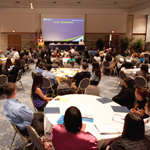Think you left your neurotic Shakespeare professor’s obsession with plagiarism behind when you went to medical school? Think again. The same tools that can ferret out a cribbed paragraph from Wikipedia might present an opportunity for EHR experts looking to curb the practice of reusing old EHR documentation for multiple encounters or multiple patients. The practice of cloning documentation can put patient safety at risk, create useless, cookie-cutter records, and allow providers to defraud the government by billing for non-existent services or sneaking in codes with higher reimbursement rates than the procedures actually performed.
Cloning documentation by copying and pasting previous notes, or importing information from a different patient’s file, is a much-debated topic among physicians who use an EHR every day. Some say it saves time, makes them more efficient, and reduces some of the frustration involved in the EHR workflow. Others say it’s a dangerous shortcut that can cause serious errors, blunt the specificity of documentation, and potentially leave critical information out of a patient’s record, or continue to forward inapplicable and outdated information to the next day’s notes. CMS has taken a strong stance against cloning, since it can lead to improper billings, and the search for reliable tools to detect cloning and upcoding is ramping up.
Marilyn Skrocki, Associate Professor at Saginaw Valley State University in Michigan, suggests that standard academic plagiarism detectors could easily be adapted to the EHR space. “Software that verifies the originality of written work is de rigueur in academic settings,” she writes in a guest post for GovernmentHealthIT. “Upon submission of a document, the tool quickly identifies original author, date, and color-codes portions of the submitted electronic document. Conceptually, the same software that detects when students submit a cut-and-paste class paper could also detect cloning within an individual’s electronic health record.”
Ahead of ICD-10, specific and applicable documentation is going to become even more important to providers if they want to get paid for their work. With 78% of physicians copying and pasting significant portions of their progress notes, CMS has a lot of work to do in order to discourage the prevalent behavior. Stern letters from HHS and the attorney general might not be doing the trick, but if physicians know their notes will be subjected to rigorous detection software, that might change the game.
Should academic plagiarism software be used by CMS to flag suspect documentation? Or is cloning one of your favorite features in your EHR? Comment below to join the debate. Source























